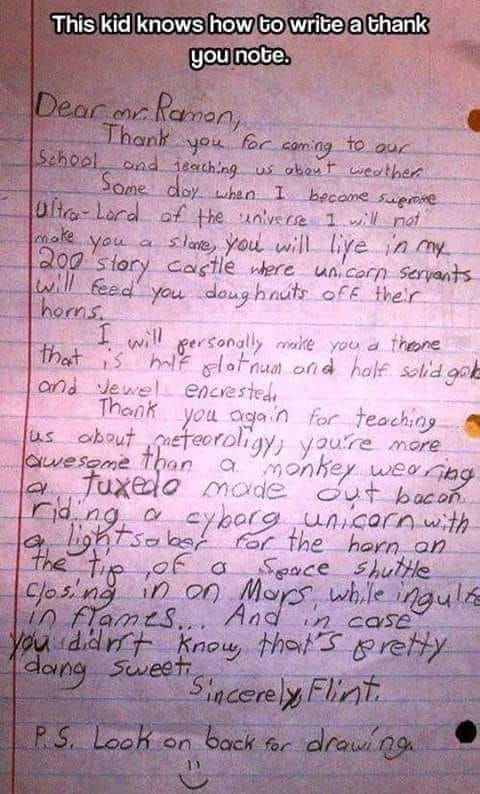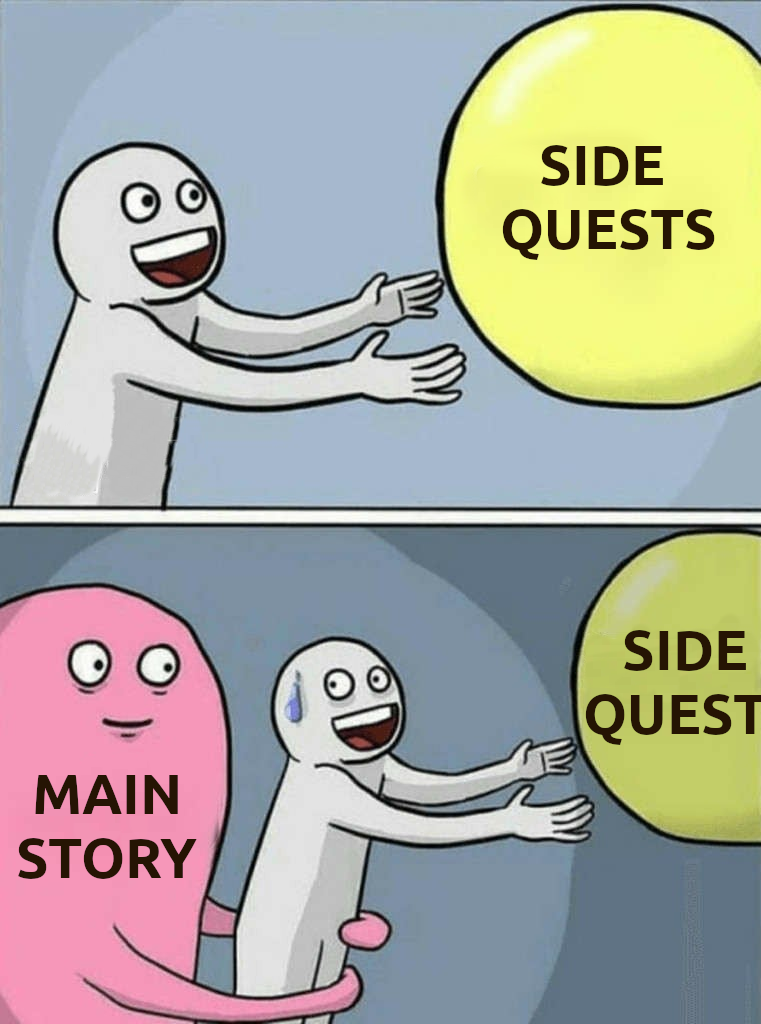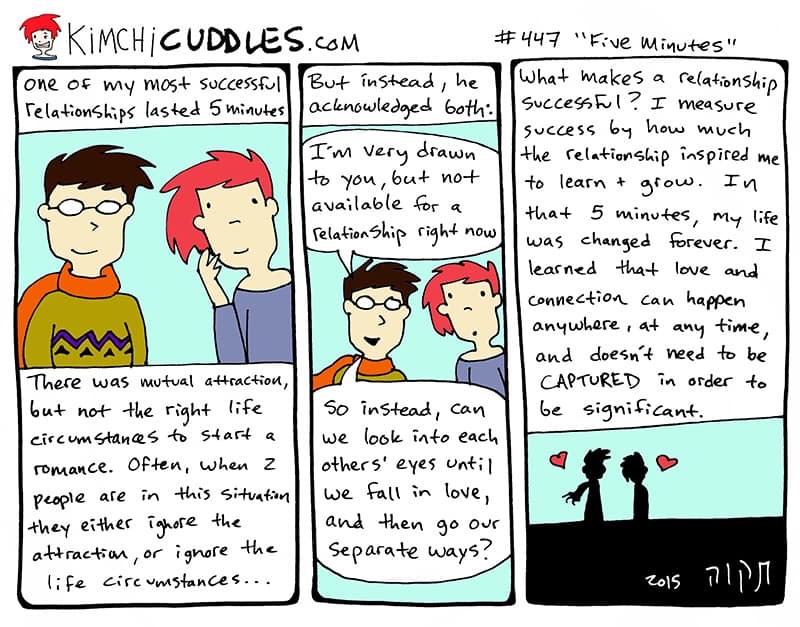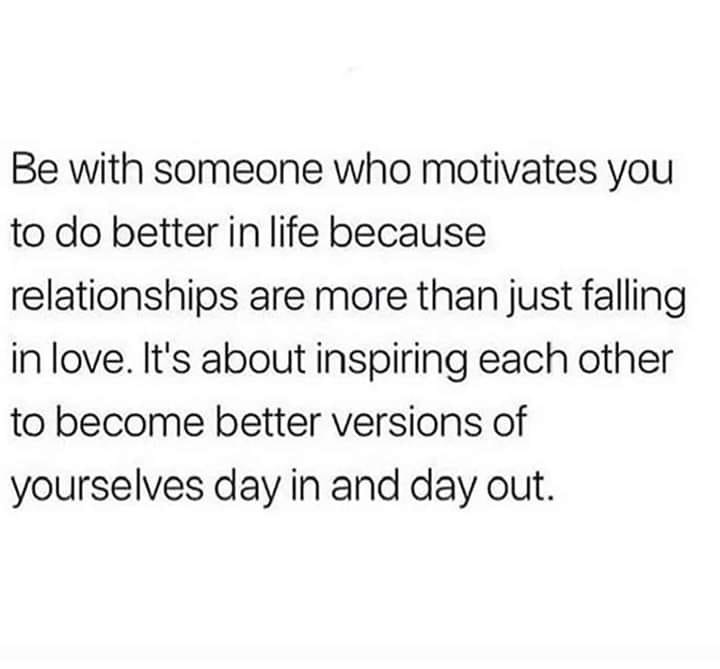I want to talk about what defines successful (and unsuccessful) relationships. Yeah, that might seem like a weird place to start, but I think you’ll see after the first section why it makes sense. And, yes, I am definitely going to eventually talk about how to meet people, how to start relationships, how to gauge where it’s going, but before we even think about that, we kinda need to know what we’re looking for.
If you decide you want to start hunting, for instance, but you don’t really think about what kind of game you want – how many people do you need to feed, how much freezer space do you have, are you a vegetarian – you’re not going to be terribly well-equipped out there in The Outside, regardless of what kind of equipment you think you have. It’s just as possible to be over-equipped as it is under-equipped.
Seriously, what’s “success”?
Just like with jobs, “successful” can mean a lot of different things, depending on your context. We need to start by examining what Legacy Artifacts (or even Malware) are installed that nudges our expectations – often quite a lot.

I want to begin with proposing a Postulate that a successful relationship is one that provides you with everything that that specific relationship is capable of providing.
Okay, but what do we get out of relationships? What are they for? What is the range of options, so to speak?
It’s the societal knee-jerk answer to say “security” and “love” and “health benefits.” There’s also “guaranteed sex partner” and “Saturday night movie partner,” but that’s not what our relationships truly provide us.
Rather, consider that relationships – all relationships – relationships with your parents, your siblings, your lovers, your bank teller, your boss, your coworkers, complete strangers, even – each provide you first with the opportunity to examine yourself.
Humans are weird in that we are first selfish and self-serving – as in, this is the child phase of our lives – and it requires a conscious process to convert our emotional state to one of empathy, compassion, and the outward gaze. This is a big piece of what puberty does for us, and often rites of passage are designed around converting that Me-Love (different from “self-love,” we’ll get to that at a later date) into Group-Love. USian Society might be a little disadvantaged (very disadvantaged) because we have no rites of passage that perform the same function. Our “rites of passage” are things like buying your first pack of cigarettes or a lotto ticket at 18 (even if you don’t smoke or gamble as a habit), or getting blazing drunk when you turn 21. The closest thing we’ve got to exercising Group-Love is registering to vote, though few kids really understand the value of that action.
This means that our best opportunity to evolve our self-concept is through the eyes of others, and a romantic or intimate relationship is the deepest means of self-reflection possible.
I’ve mentioned before – and I will mention again – that no two people experience you the same way. You are a different person to every single other person you meet because there is no way that two people can see you through exactly the same filter of events and experiences that created their unique perspective of the world. This is part of why you can date a person and think they’re absolutely amazing, but if you ask their ex, they’re the worst piece of shit on the planet.
The second part of this concept is that no one single person can provide you with a complete view of yourself. Your parents provide some of it, your lovers, your boss… and the greater question is, what do you do with this information, with this reflection?
Well, what happens when you look in a mirror and you see that your hair had a wild party last night, and didn’t even bother inviting you? You grab a brush or comb – or in worst-case scenarios, the clippers – and you fix that shit. What happens if you look in the mirror and see a gorgeous face looking back at you? You feel good about yourself, and you want to make sure you keep doing that thing with your eyebrows or your smile or your whatever.
This is the first phase of a relationship, this opportunity for self-reflection.
The second phase – which, honestly, can happen at any point before, during, or after the first phase – is empathy – connecting with someone else’ being or experience in a way that you understand and appreciate significantly.
(Appreciate does not mean “to think you’re super-duper.” Appreciate means “to recognize the value of a thing.”

Sometimes that value is less than a shit-covered turd rolled in dung on a pile of guano, sometimes it’s more awesome than a monkey wearing a tuxedo made out of bacon riding a cyborg unicorn with a lightsaber for the horn on the tip of a space shuttle closing in on Mars while engulfed in flames… and in case you didn’t know, that’s pretty dang sweet.
To bring it back to the point at hand, the key element is that these twin events of self-realization and empathy happened.
Which means, a relationship can be “successful” for you but not “successful” for the other person. “I’m just not that into you,” is the worst feeling in the world when you feel like you can be your best self around someone and see their best qualities down to the corners of their souls – or even just feel a connection that inspires you in ways that you don’t feel with anyone else – but they are not required to return the connection.
What gives that experience the potential to make relationship is when both parties have that ZING. And the funny thing about Zings is that they don’t just happen once, they don’t have conditions, they don’t even occur the same way twice, and sometimes they leave as quickly as they left if you’re not in a position to nurture them. They sometimes don’t even seem to have any logic to them – “I have no idea why I’m into this chick, I just am” – until you realize what you’re really experiencing.
Sometimes successful relationships are short ones that only provided a little insight, and sometimes they last the rest of your life. BUT, a relationship that lasts the rest of your life is NOT necessarily successful. AND you have totally have (and absolutely SHOULD have) more than one successful relationship in your life.

You’ve heard me talk about side-quests before, and I want to throw this out there: you are not a failure at love if you find yourself “stuck” in endless side-quests and never finish the alleged “main story line.” Anyone who has ever played Skyrim or Fallout 4 can attest to this.
If you’re dating and dating and dating, and you feel satisfied with what you’ve accomplished in those relationships, but never grab the brass (or gold) ring, there’s nothing wrong with that. I see a lot of people stressing themselves out over the lack of Wedding Event Instance in their life, and… it’s really not that big of a deal. Their stress over “not being successful” gets in the way of them examining what they truly accomplished and learned in those relationships.
Because the instance never triggered, they get hung up on “what went wrong.” They obsess over what’s wrong with them or what’s wrong with their former partner; they get stuck in the cycle of “not lovable enough” or “bad taste in partners” or “all [preferred genders] suck” or whatever – when an honest examination reveals that none of those things was ever a factor. I am here to give you explicit permission to not get sucked down that hole.
Just because a relationship ends doesn’t mean that it’s a failure. Every single one of them – good, bad, boring, flashy, sad, happy, whatever – had an opportunity to teach you something about not just the other person but also about yourself, as we’ve established.
This means – and this is sometimes the hardest thing to really grasp – that even if the relationship was crap – if it was unfulfilling, abusive, toxic, absent – if you learned as much as you could about yourself and developed a level of empathy for the other person, it was a successful relationship. That does not mean it was a happy relationship, but it satisfied the conditions of our original postulate that it provided to you everything that it could.
For the record, I will never, ever say anything like, “Everything happens for a reason,” unless that reason is that you’re acting stupid by making the same mistake over and over again.There is no woo-woo destiny that brings things together except by the chaotic factor of all life, which is a whole other conversation.
HOWEVER, I will strongly encourage you to make the best of any and all situations, no matter how fucking awful they might be. And I’ve personally been through some of the worst.

To recap just a bit, these two folks had enormous attraction for each other, but their life circumstances just didn’t work out. Maybe they had too much on their plates, maybe they lived in different cities, maybe their polyam dance cards were too full – or maybe they weren’t practicing polyam at all at that point. Maybe their work schedules were opposite of each other, or maybe they were recovering from an intense recently past relationship or other grief. They only shared a brief moment of deep soul-level adoration, and then they went on with their lives. Whatever the reason for going their separate ways, the point that the comic makes is that you don’t have to justify your feelings through action if taking action is going to hurt you or your partner (or your other partners if you’re polyam).
And, yes, a five-minute relationship is still a valid romantic connection if you let yourself fall in love because falling in love is the most perfect moment of reflection and joy and empathy that anyone can have. If it only lasts five minutes or if it lasts a lifetime – or if it lasts two years, or six months, or twenty years, if it never culminates in sex, never even comes to regular communication, never turns in to the traditional impression of a “real relationship” – it’s the purity of the emotional connection that matters more than anything else.
Love teaches us about ourselves before it teaches us anything about anyone else. It teaches us what we’re capable of, how we can view the world, what the little beauties or the massive grand expanses are. It teaches us how deep our joy can go, and sometimes how deep our sorrow – and those are completely equal because, as Kahlil Gibran reminds us, the issue from the same well.
Real Life Examples
I’ve enjoyed a few of those in my life as well, and I was deeply tortured by that sheer magnitude that I felt before I realized that I didn’t haveto validate them or even act on them to say that I felt the thing.
There were two occasions, both of which happened before I even knew what polyam was. In both cases, I was in a relatively committed relationship, and I developed feelings for my partners’ best friends. Like, uncomfortably intense feelings. I didn’t want to choose, and I didn’t want to cause rifts between them – I was the newcomer, I was just the new chick, I didn’t have that right – so I just sat there, tortured and confused, but I wanted to spend as much time with the best friends as I could because they made me feel… solid, real, appreciated for me rather than as a sex thing. These were things that maybe I wasn’t able to get from my primary relationship because… age, maybe, or just the nature of that relationship. There was some attraction both ways (I’d like to think), but that wasn’t ever going to get acted on.
It was like always wanting to go over to the neighbors’ house because she had the best tea and her place always smelled like exotic spices and incense, and there were cats and lush plants everywhere, and she talked about far away places and strange things and wonderful adventures… and then still being happy to go home in the afternoon to see your parents because you still love them and that was where dinner was going to be, after all.
The first one taught me the joy of sculpting tiny things, of making dolls and giving them personalities and jobs and purpose. They taught me a few little Spanish words for our Hemingway cats – and we had a lot of them, those funky cats with opposable thumbs – and for the first time, Spanish sounded like a real language instead of background noise that I couldn’t understand. That’s not in any way a slight to Spanish speakers, but my autistic brain kind of filtered it out since I was often so overwhelmed with sound and lights and noise and texture that I think it had to just shut some things off. “Brain doesn’t know what that is, but it’s clearly not a threat, so set to Ignore.”
The other one was a musician, and they taught me about electronic music and that age didn’t matter nearly as much as experience. They taught me that sometimes you know your friends don’t have the best habits or beliefs, but you can choose to go along with it, mostly so they don’t push you away, and then you can be there to keep them out of the worst trouble. They taught me that soft nudges and knowing glances can be just as powerful as harsh words and screamed ultimatums. They taught me how to let people lie to you – even though you know they’re lying – just to see how far they’ll take it; that trust is not always about whether someone is going to be “true” or “honest” or “faithful” to you but rather what they believe is true about themselves.
I like to think that I brought them something of value, too – maybe how to laugh at goofy things, or maybe how to take things too literally, or maybe that there’s always an answer, and whether you like it or not is immaterial – but in the end, I don’t speak to either of them. The doll maker is gods know where, and the musician committed suicide a few decades ago. They’re both with me all the time, though, because being with me is not a requirement to being the object of my love, and I still value and use the gifts they brought into my life.
Intimacy versus Sex

I once wrote a whole article over on my other blog (back in 2014!) about how naked isn’t sexy. It’s about trust and vulnerability, and people can be completely unclothed and still not be “naked.” Sometimes people use layers of clothing not to denote modesty but rather levels of trust. People who’ve been together enough to share deep trust might sleep in their “altogethers” all the time but only have sexual exchanges a fraction of the time. (Or all the time, it’s not a big deal, we’re not judging either way.)
In order to gain trust and be capable of vulnerability, though, we have to understand about Truth and Honesty, because they are absolutely not the same thing. Truth is about facts, and Honesty is about emotions (or opinions).

This is a red chair. That is the truth. We can see and verify that it has two arms, four legs, is made of a non-fabric material, probably plastic. We could maybe debate the parts about the purpose of the chair, where it lives, what it feels like to sit it in, but the facts are the facts: it’s a chair, and it’s red. In all likelihood, it will not change without some kind of external influence, such as getting left out in the sun to get bleached (no longer red), or broken into little bitty pieces with an axe (no longer a chair).
Honesty is a little different, as it refers to how you feel in any given moment. It’s about feelings and opinions and things change over time. It’s completely honest to say that you were angry last week, but you aren’t right now. Or that you loved this one restaurant, but you’ve gotten tired of it. That doesn’t make you a liar for saying today that you don’t like that restaurant right now even though you did before. What would be a statement of dishonesty is to pretend that you never liked that restaurant when you actually used to.
A much more common dishonesty is when someone says, “Are you okay?” and we reflexively say, “I’m fine.” Bitch, you’re smoldering and smoking from having just being on fire! You’re not okay! You need serious help, even if the flames are technically out!
But, in our weird world, we don’t trust people enough to be honest with us unless we have an established relationship of trust. Femmes…
femmes are defined as anyone who identifies full or part time as female: assigned-sex-at-birth or wears a frock a lot or identifies as trans or any other variation, they are FEMME, FIGHT ME.
…especially are societally trained to default to “I’M FINE, I DON’T NEED HELP.” Femmes developed this response because needing help means vulnerability – but not the consensual vulnerability that happens in a relationship of trust. If an unknown man walks up and offers to help, we try to turn into Wonder Woman because we’ve seen or heard to know personally how many times that kind of situation goes horrifically bad. Most predators are opportunists, after all, and our culture of toxic masculinity has societally trained way too many cis-men to be predatory. (We’re going to have some whole other conversations about toxic masculinity versus healthy masculinity later, so don’t flood my comments or inbox just yet.)
The distrust bleeds into every part of the process. Femmes have had lovers, friends, family, or whoever – all of whom started from a place of trust – turn out to be abusive or shitty or neglectful or dishonest or lying or whatever.
For femmes to let down their guard and enter into a place of trust where honesty can be a thing at all
- they have to want to do it at all (because investing unwarranted trust is exhausting)
- they have to be in a mental and emotional place to consider it (because they need to have the energy to invest, otherwise it’s exhausting)
- they have to see evidence on some level that the object of their interest is capable of handling that trust (because getting a beat-down or a blank face instead of positive feedback is exhausting)
- they have to overcome their past programming that being honest is unsafe (because everything in our social spheres and media remind us that it’s unsafe, and overcoming that constant messaging is exhausting)
- they have to feel strong enough to handle rejection if honesty is still unsafe (because we’ve learned that sometimes our honesty is used against us, and that’s exhausting)
- and they still have to wait for a socially or personally appropriate opportunity to test the waters for that honesty (because interrupting the unknown machinations of the partner’s brain to could wind up ruining any sort of future success, and the stress if that is exhausting)
Yeah, no shit, it’s really the complex, and it’s really, really exhausting if you didn’t get that message before. In a way, femmes have to be hyper-vigilant because their capacity to trust others with their own honesty is predicated by others being honest with them in the first place – and that’s a whole other ball of snot.
If femmes trust too easily, they’re being reckless or irresponsible or naive. If they don’t trust as easily, they’re being uptight, prudish, snotty. It truly feels like there is no winning, especially when the “prize” might be extreme victimization.
Oh, did I mention hyper-vigilance? Yes, you got it, that is a common state for people with PTSD. Weird, isn’t it. So strange.
For cis-men (and I make that distinction because trans-men kinda start from a different place emotionally, and we’ll get into that in a later discussion), the time for honesty is…
… well, often, almost never.
They’ve been taught by The Patriarchy that their feelings and emotions are weaknesses and that their tears are stupid and that if they are really honest about how they feel, they’ll be beaten down and emasculated and no one will ever respect them and RESPECT IS EVERYTHING and GOTTA BE STRONG ALL THE TIME ALWAYS SUCK IT UP THIS IS FINE EVERYTHING’S FINE TOO MUCH BLOOD INSIDE IS UNHEALTHY CHICKS DIG SCARS MERELY A FLESH WOUND BACK ON MY FEET IN NO TIME INTESTINES TOTALLY GROW BACK, RIGHT?
Well, shit.
So, how do you build trust at all with someone, let alone enough to create intimacy?
So glad you asked! The answer is… technically, you don’t.
The absolute best you can do is to be a trustworthy person. Be mindful of your words, own the consequences of your actions, don’t be a dick on purpose, apologize when you fuck up, develop consciousness about your own emotional state, question your perceived reality against consensus or objective reality (or, as close we can get to an objective reality), and then…
The decision to trust you lies with the other person.
It’s not like you can pump “Trust Actions” into a relationship like coins into an arcade machine, and then one day, Trust pops out. The other person has to actively choose to trust you. If they have had experiences or issue with trust in the past, that’s on them to fix it. All you can really do is be a good person or partner, and then let the rest of it happen.
But… somehow, someway, it does happen. And when it does, we have to run with it.
So, how can you really tell when you have the right relationship going on? What are the signs that it could be or even currently is what we would call successful? This list leans a little bit towards the longer-term version of “successful” rather than the five-minute version, because, hey, that’s kinda what we’re all usually in the mood for.
1. Communicate Effectively.
The first thing is that you’re able to communicate effectively. This means about all kinds of fun things – money, sex, drugs – but also un-fun things like laundry, chores, childhood traumas. Effective communication is not just things like Saying Good Words, it also means shutting your gob for a minute and actively listening to what the other person has to say.
That means considering their perspective honestly and responding appropriately instead of just waiting for them to take a breath so that you can have your say, without regard to what they were saying.
2. Compatible Values.
The second thing is that you have shared values. This is a really big topic that’s not easy to quantify usually, but the big parts are, do you have compatible political views? How do you feel about children – having them, raising them, disciplining them? What’s your stance on current events like LGBTQ+ rights, Black Lives Matter, mask-wearing, hand-washing, tax-paying, gun-toting? What topics are you passionate about? These are the big ones.
It’s not just about the Major World Things, though: it’s also about things like hobbies and frequent activities. Does your down-time center around going out into the Out and doing Outside things at clubs and parks and Outdoors? If so, your Very Indoor Pet partner might have some issues finding time to spend with you as they do not like to go into the Out.
And, of course, none of this is possible to negotiate without effective communication first.
3. Gauging Resiliency.
The third thing is, gauging resiliency. Which is to say, how well do you (collectively) change your mind about something when you are presented with objective evidence that you are wrong? How quickly are you willing to resolve an argument for the betterment of both parties? What style of grieving are you prone to experience? How quickly do tend to forgive people? How do you prefer to handle stress?
Resiliency is something that we absolutely will be having a whole big article on, but the short version is, how do you get back to your baseline emotional state when faced with trauma, stress, or grief? How do you get there? How do you resolve issues or disagreements so that you and your partner can get back to your baseline relationship?
4. Inspire Each Other.
The fourth thing – and probably the one that ties in best to both the long-term and the short-term types of successful relationships – is Inspiration. Does this person motivate you to be the best version of yourself? Do you find yourself uninstalling old programs that no longer serve you? Do you want to start exploring the things that you’ve put off for months or years? Do you find yourself expressing kindness more easily?
The “kindness” thing is really a BIG gauge because it’s the part that indicates that love is really the thing at play. When you are in love and having a successful relationship, your love overflows and spills all over other people.

Love absolutely is a fantastic and critical part of life. We love our family, our friends, our lovers… Often, it’s what makes life worth living, either by the support of it or the pursuit of it. Frankly, we can apply this idea about keeping inspiring people around us to any of those types of relationships. Can you just imagine how incredible you could be as a person if everyone around you was supporting you not only in your scholastic or vocational goals but in you as a person?
Legacy software that affects your OS
I know there’s a huge portion of the population that only thinks of romantical relationships when we use the word “love,” but if you really want to understand how your successful relationships happen, it’s pretty vital that you allow yourself to step outside of that tiny little box. All of your intimate relationships do not just include the ones that are romantic in nature, and those other intimate relationships predicate your capacity to engage in potentially successful relationships with others.
Think about your best friend when you were growing up, the person that you were absolutely the closest to. Or think about your sibling that you had the intense connection with. Or maybe you were amazingly close with one or both of your parents. Regardless, call the mind the closest relationship when you were a child, specifically, and that will always be the standard by which your adult intimate relationships will be measured.
This is true regardless of whether they were healthy or toxic, short or long-term, part-time or full-time. It doesn’t matter how it ended or even if it ended, that’s a huge part of that legacy software we’ve been talking about – the stuff that permanently affects the way all other programming is installed in you. So, if you have a hard time even figuring out what “successful” has ever meant – and you’ve had a harder time unraveling it – these little tidbits are a great place to start.
Follow me on Twitch to get notified when we go live, we’ve got the Twitters at LoveBytesHard.TV and that’s the same handle over on the toobs of yoo when we upload the videah for long-term viewing. You can pop by the Discord server, too, and send me questions, talk about stuff after the stream, and, you know, stuff.
